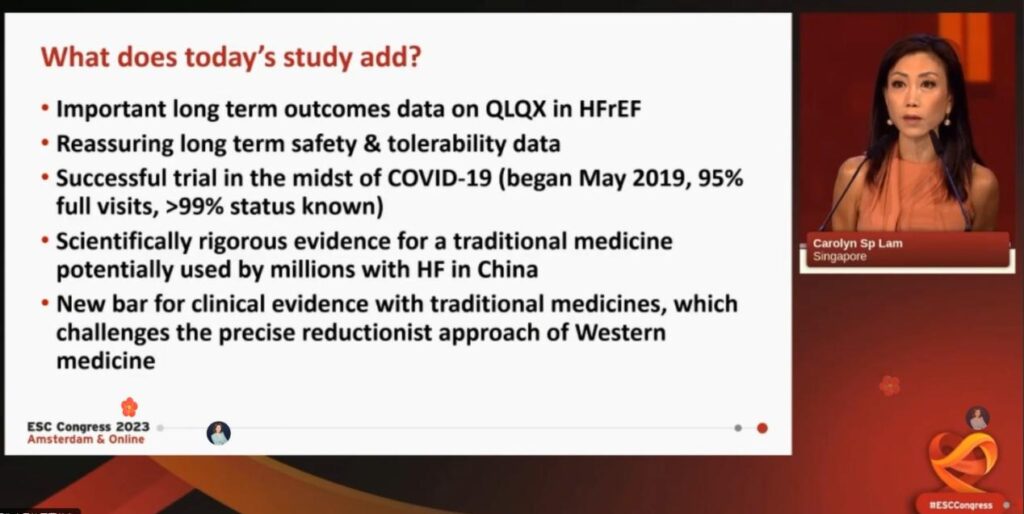Heart failure represents a severe manifestation or an advanced stage of diverse heart conditions. Moreover, it stands as one of the utmost challenges within the realm of cardiovascular diseases in the 21st century. Its mortality rate is similar to that of common malignant tumors.
The latest study indicates that adding the traditional Chinese medicine Qili Qiangxin Capsules to the standard of care for heart failure can significantly reduce the risk of re-hospitalization due to worsening heart failure and cardiovascular death in patients with chronic heart failure.
On August 26, local time, Prof. Xinli Li, an expert in cardiovascular diseases, unveiled the aforementioned study results during the European Society of Cardiology (ESC) Congress, a leading global academic conference in the domain of cardiovascular medicine, held in Amsterdam, Netherlands.

On August 26, local time, Prof. Xinli Li delivered an academic presentation during the Hot Line session at the ESC Congress.
Prof. Xinli Li pointed out that the results of a randomized, double-blind, placebo-controlled, multicenter clinical trial involving 3119 patients with chronic heart failure, conducted in 133 hospitals across mainland China and the Hong Kong Special Administrative Region (China), over a treatment period of 12 to 36 months, revealed that Qili Qiangxin Capsules could reduce the risk of the primary composite endpoint event, which includes re-hospitalization due to worsening heart failure and cardiovascular death, by 22% (with a decrease of about 24% in the risk of re-hospitalization due to worsening heart failure and a 17% decrease in the risk of cardiovascular death). These results displayed significant differences. The capsules also decreased the risk of various secondary endpoint events, including all-cause mortality, composite endpoint events (such as worsening heart failure leading to discontinuation of treatment, successful resuscitation after cardiac arrest, malignant arrhythmias), and reduction of NT-proBNP levels. It provides an effective therapeutic medication for improving the long-term prognosis of chronic heart failure, and has demonstrated good safety as well.
Prof. Xinli Li emphasized that the Qili Qiangxin Capsules stand as an innovative medicinal development, guided by the principles of TCM pulse theory. This marks the first application of TCM pulse theory to delve into the origins and treatment of chronic heart failure. This drug was introduced to the market in 2004 and stands as the pioneering patented traditional Chinese medicine substantiated by evidence-based medical research, effectively addressing chronic heart failure and its underlying factors. Past studies have proved that the Qili Qiangxin Capsules exhibit multi-target collaborative mechanism that plays a role in ameliorating heart failure symptoms and enhancing cardiac function. The relevant study was published in the esteemed international cardiovascular journal “Journal of the American College of Cardiology” (JACC) in 2013. It was recognized by JACC as a highlight of academic achievements for that year: “The study affirmed the reliable efficacy of Qili Qiangxin Capsules and their synergistic effects when combined with Western medical treatments. This has provided substantial benefits to heart failure patients.”

On August 26, local time, Prof. Carolyn Sp Lam, a Senior Consultant at the National Heart Centre Singapore, delivered a presentation and engaged in a discussion during the Hot Line session at the ESC Congress.
This study is recognized as the first randomized, double-blind, placebo-controlled trial that targets the tangible outcomes of employing traditional Chinese medicine in the treatment of chronic heart failure. During the Congress, Prof. Carolyn Sp Lam, a Senior Consultant at the National Heart Centre Singapore and the NUS Yong Loo Lin School of Medicine, and an invited participant in the discussion, highlighted that this study offers robust scientific evidence for Qili Qiangxin Capsules—a traditional remedy extensively used by millions of heart failure patients in China. The evidence substantiates the drug can significantly reduce cardiovascular event incidence among patients with chronic heart failure, and diminish the risks associated with re-hospitalization due to worsening heart failure and cardiovascular death, all while reaffirming its long-term safety profile. This study raises the clinical evidence level for traditional Chinese medicine and establishes a novel yardstick for clinical evidence within the realm of traditional medicine.
